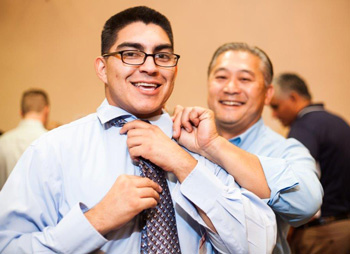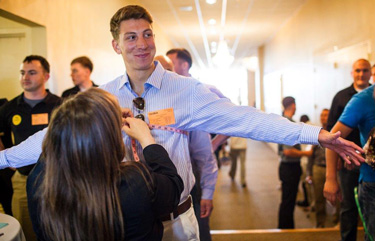Law Suits program helps the
unemployed dress for success
By Amy Yarbrough
Staff Writer
It began with a simple request in 1996: Norman Rodich’s
now-wife Susan needed clothing for a donation drive a coworker organized to help
people down on their luck get back into the workforce.
Rodich pulled a suit, shirt, tie and shoes from his
closet, a small effort that turned out to have a big impact on the ultimate
recipient.
“I later heard that … the suit fit him reasonably well, and
he went to the interview and got the job,” said Rodich, a partner at Palmieri,
Tyler, Wiener, Wilhelm & Waldron in Irvine. “It got me thinking, ‘This is a very easy thing to do.’”
 |
| A volunteer from the Boeing Company makes sure a client’s tie is just right at a Working Wardrobes event. Photo courtesy of Working Wardrobes. |
Wanting to build on the idea, he approached Working
Wardrobes for a New Start, an Orange County nonprofit that initially focused on
helping female survivors of domestic violence. The State Bar Litigation Section's "Law Suits" program was born. The group collected donated business
clothes through the State Bar’s Litigation Section to be given to women locally.
The following year, Working Wardrobes expanded their services to men, and
Rodich reached out to The Men’s Wearhouse retail chain, forging a partnership
that continues to this day.
The Litigation Section’s “Law Suits” program, which inspired
The Men’s Wearhouse to launch its own larger effort, celebrates 15 years as a
statewide clothing drive this year. This year’s drive lasts from July 1 through 31. Donations of suits, dresses, ties, shirts, belts and shoes can be dropped off
at any Men’s Wearhouse location. Both men and women’s clothing will be accepted.
Though a subject of ire for many in the working world,
business suits can be very empowering for men and women facing the challenges of
getting a job, according to Jerri Rosen, founder and CEO of Working Wardrobes,
which also provides skills training, job placement and other services to its
clients.
“It’s a very interesting dynamic. There were times I thought
the suit was just a little too fluffy,” she said. But for recipients, “it’s a
game-changer. They’re a different person. They see the possibilities.”
Cory Vigil, a former client turned Working Wardrobes
employee, said a lot of people come into the nonprofit’s office tired and
feeling defeated by problems in their lives.
“At the beginning they are not really smiling, they are not
opening up. You start to see the difference,” he said.
 |
| A Marine gets measured for a suit at a recent event Working Wardrobes for a New Start held at Camp Pendleton. Photo courtesy of Working Wardrobes. |
A combat veteran, Vigil did two stints in the Navy, during
one of which he saw his best friend killed next to him. He came home suffering
from PTSD and depression, and had no good job prospects.
Vigil started drinking and ended up getting in a bar fight
that led to his incarceration.
Working Wardrobes’ services helped him to address and fix his
issues, Vigil said. “They just gave me the tools for me to forgive myself.”
Working Wardrobes can now help men like Vigil thanks in part
to Rodich, who was the “linchpin for us in making our services available for
men,” Rosen said.
In January 1998, Rodich wrote to the company’s then CEO
George Zimmer asking for financial support, clothing donations and volunteers.
The company responded by donating 30 sport coats, 25 suits and boxes of dress
shirts, sportswear and accessories.
The creativity in his letter to The Men’s Wearhouse helped
launch an 18-year partnership, Rosen said.
Rodich said the collaboration has turned out to be “much
bigger than the Law Suits program.”
Inspired by the success of the Law Suits program, The Men’s
Wearhouse launched its National Suit Drive in 2008. Between the two efforts, more
than 1.1 million items have been collected since 2002.
“It turned out to be a very nice thing and it’s helping a
lot of people,” Rodich said. “I think that’s one of the great legacies of the
Law Suits program.”
Rodich said another great aspect is being able to go to the
events where clothes are handed out and see how much of a difference they make.
“They don’t solve all the problems people have but they do
help with an important problem,” he said. “If you don’t have the right
wardrobe, you can’t get through the door sometimes.
“A lot of people have actually never worn a suit,” he added.
“They do feel a transformation most of them have never felt before.”
Rosen said some people tear up when they see themselves and envision
something positive in their future.
“That’s very, very powerful,” she said.